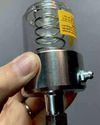
Oil analysis is a diagnostic, predictive maintenance tool for monitoring and evaluating lubricant and equipment conditions. Participating in an oil analysis program allows you to see what's happening inside your equipment to identify issues, prevent catastrophic failures and increase equipment reliability.
Testing and analysis provide vital information as to the condition of both the oil and the equipment being tested. Wear particles and contamination concerns can be identified using several methods and, if left unchecked can severely affect equipment performance and reliability or cause a significant failure. In addition, sources and causes of equipment issues like abnormal wear, lube degradation, and component failures can be identified and mitigated.
Predict Maintenance
Playing a crucial role in predictive maintenance strategies, oil analysis results can help foresee maintenance needs by providing early indicators of potential issues, including fuel dilution, excessive idling, and component malfunctions. Establishing and monitoring trends within the oil properties can identify changes or deviations from normal operating conditions and may reveal deteriorating conditions, increased contamination levels, and degradation of the lubricant,
Establishing a trending history of oil analysis for equipment components can give early indications for maintenance activities like oil changes, filter replacements, and component repairs before the concerns turn to failure.
Oil Analysis Value: More Than Testing
Standard oil analysis tests include Elemental Analysis by ICP Fuel Dilution, Nitration/ Oxidation, Acid Number/Base Number, Viscosity, Particle Count, and many more. Each of these tests, performed by an accredited laboratory, provides equipment users with test results with severities, a review by a Data Analysts team, and maintenance recommendations to address the identified concern.
This story is from the January - February 2024 edition of MACHINERY LUBRICATION INDIA.
Start your 7-day Magzter GOLD free trial to access thousands of curated premium stories, and 9,000+ magazines and newspapers.
Already a subscriber ? Sign In
This story is from the January - February 2024 edition of MACHINERY LUBRICATION INDIA.
Start your 7-day Magzter GOLD free trial to access thousands of curated premium stories, and 9,000+ magazines and newspapers.
Already a subscriber? Sign In

The Secrets For Implementing A Clean lubricant Program
If you could find an investment that guaranteed a return 40 times greater than your initial investment, you probably wouldn't pass it up.

MAINTAIN? REPAIR? REPLACE?
When considering the life of any asset, the question arises: what types of interventions should be planned to keep it operating or to restore operation in the event of its failure?

Engineering Reports Should Be Like Bad Movies
I'm frequently asked to review engineering reports, and I'm continually baffled by how many engineers want to take their readers on a journey instead of getting to the point.

WHY SCHEDULED OIL CHANGES AREN'T ENOUGH TO MITIGATE LUBRICANT CONTAMINATION
There are few problems more insidious or damaging to large industrial machinery than contaminated lubricant.

LUBRICATION CONTAMINATION PREVENTION
How many articles have you read, or seminars listened to, that tout the value of contamination control? If you are like me, they number in the hundreds—if not thousands. One thing about these articles and seminars that bothers me is the word “control”.

LUBRICANT CONTAMINATION PREVENTION AND MITIGATION: A Guide For Maintenance Professionals
Lubricants are essential for the smooth and efficient operation of many types of machinery, from engines and turbines to gears and bearings.

TASK-BASED TRAINING | INSPECTING A SINGLE-POINT LUBRICATOR
A single-point lubricator is a device engineered to attach to a single unit to regularly and automatically deliver a small amount of clean grease or lubricating oil to a specific area.

TOP LEADERSHIP FOCUSES FOR IMPROVED RELIABILITY AND COST REDUCTION
Here’s a scenario that may sound eerily familiar – you have a new reliability initiative.

4 KEY ELEMENTS FOR INTERPRETING AN OIL ANALYSIS REPORT
Years ago, a customer came into my office, visibly upset. He had just received his second oil analysis report for one of his Caterpillar gas engines.

ASTM ENHANCEMENTS TO MICROSCOPIC PARTICLE IDENTIFICATION AND DOCUMENTATION
In 1982, Daniel Anderson published his influential book, \"Wear Particle Atlas\", which describes, sizes, and classifies particles found in oil.